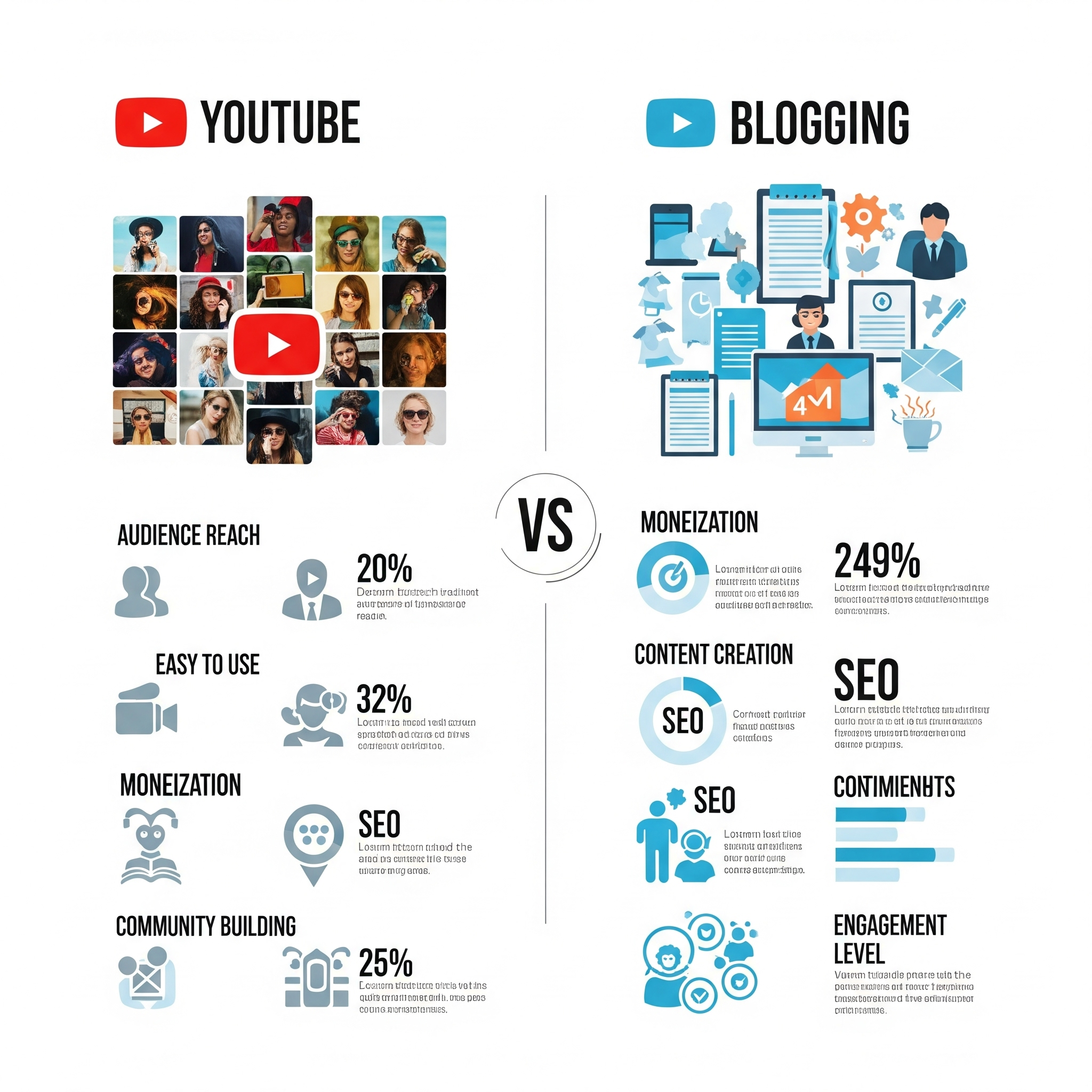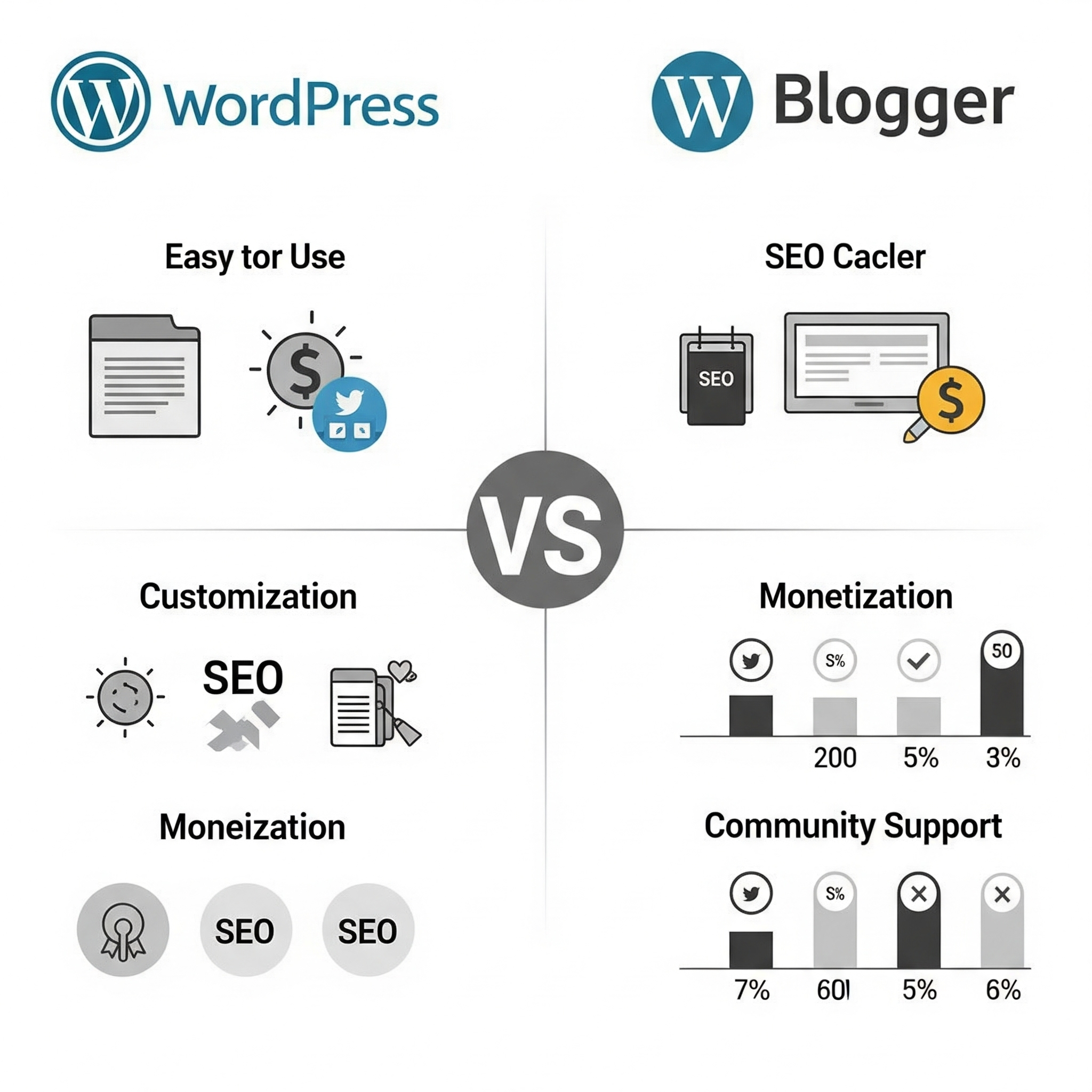In todays digital era. when it comes to making money online or building a personal brand, two platforms stand out: YouTube vs Blogging. Both platforms have helped millions of creators, marketers, and entrepreneurs reach their audience, generate income, and build authority.
If you want to start and you are confused to start with which platform then here is the detailed comparison of YouTube vs Blogging will help you decide based on your goals, skills, and resources.
What is the Difference Between YouTube vs Blogging?
Before getting into this lets know the basic difference between YouTube vs Blogging.
- YouTube is a video-sharing platform where creators upload video content. YouTube is owned by Google and has over 2 billion logged-in users monthly. From educational videos, vlogs, tutorials, to entertainment, YouTube offers every type of content in video format
- Blogging involves publishing written content on websites or blogs. It can be done on personal websites, niche blogs, or platforms like WordPress, Blogger, or Medium. Blogs often provide detailed guides, how-to articles, personal experiences, reviews, and much more.
Both platforms have their strengths, and the choice between YouTube vs Blogging depends on your preferences and objectives.
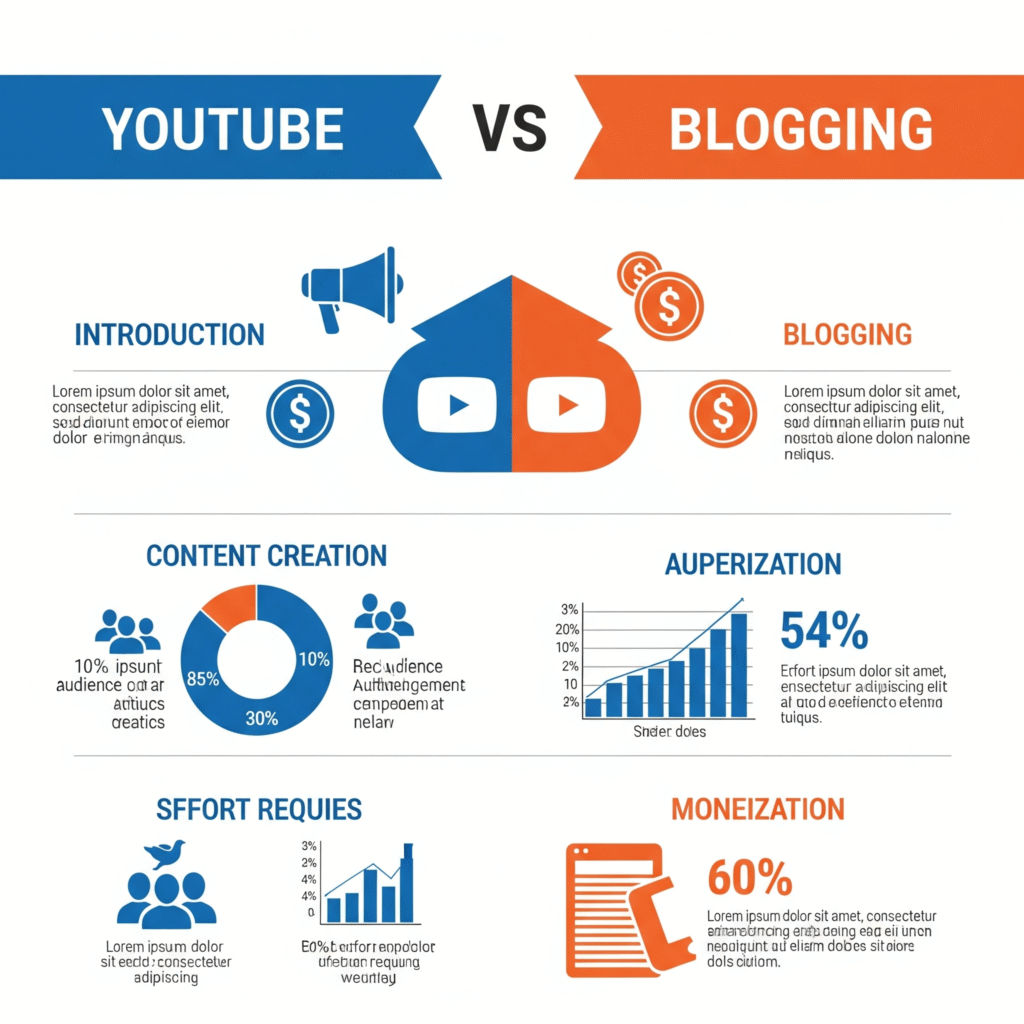
YouTube vs Blogging: Which is Better for Beginners?
For beginners, both YouTube and Blogging offer unique advantages. Let’s compare them based on key aspects
1. Ease of Starting
YouTube: Starting a YouTube channel is free. You only need a Google account, basic video recording equipment (even a smartphone works), and ideas for your content.
Blogging: You can start a blog for free using platforms like Blogger or WordPress.com. However, for serious blogging, it’s recommended to purchase a domain name and hosting, which involves some investment.
2. Content Creation Process
- YouTube: Requires video recording, editing, thumbnails, and a good presentation style. It takes time to develop confidence on camera.
Blogging: Involves writing articles, optimizing them for SEO, adding images, and formatting the blog post. If you enjoy writing, blogging feels natural.
3. Time to See Results
YouTube: New YouTubers can go viral quickly if their content resonates with viewers. YouTube’s algorithm can boost your video even if your channel is new.
Blogging: Blogs generally take 3 to 6 months to rank on Google, especially for new websites with no domain authority.
4. Monetization Opportunities
The debate of YouTube vs Blogging is incomplete without discussing money-making potential
YouTube Monetization:
- Google AdSense (after reaching 1,000 subscribers and 4,000 watch hours)
- Sponsorships and brand deals
- Affiliate marketing
- Selling courses or products
- Super Chats, Memberships (for large channels)
Blogging Monetization:
- Google AdSense
- Affiliate marketing (Amazon Associates, other networks)
- Sponsored posts
- Selling digital products or courses
- Offering services (consulting, freelance)
Both platforms offer excellent income potential, but YouTube requires crossing initial milestones, whereas blogs can start earning through affiliate marketing sooner
YouTube vs Blogging: Pros and Cons
Here’s a detailed look at the advantages and disadvantages of YouTube vs Blogging.
YouTube Pros:
✅ Massive reach with over 2 billion users
✅ High engagement rates with video content
✅ Easier to explain complex topics visually
✅ Potential to go viral and gain rapid followers
✅ Ideal for building personal brand authority
YouTube Cons:
❌ Requires video production skills
❌ You must be comfortable appearing on camera
❌ Strict monetization policies
❌ Content can get demonetized or flagged
❌ Algorithm-dependent visibility
Blogging Pros:
✅ Great for those who love writing
✅ Full control over your website and content
✅ Passive income through evergreen articles
✅ No need to appear on camera
✅ Easier to target long-tail keywords with SEO
Blogging Cons:
❌ SEO takes time to show results
❌ Requires technical setup (domain, hosting)
❌ High competition in saturated niches
❌ Consistent writing needed for growth
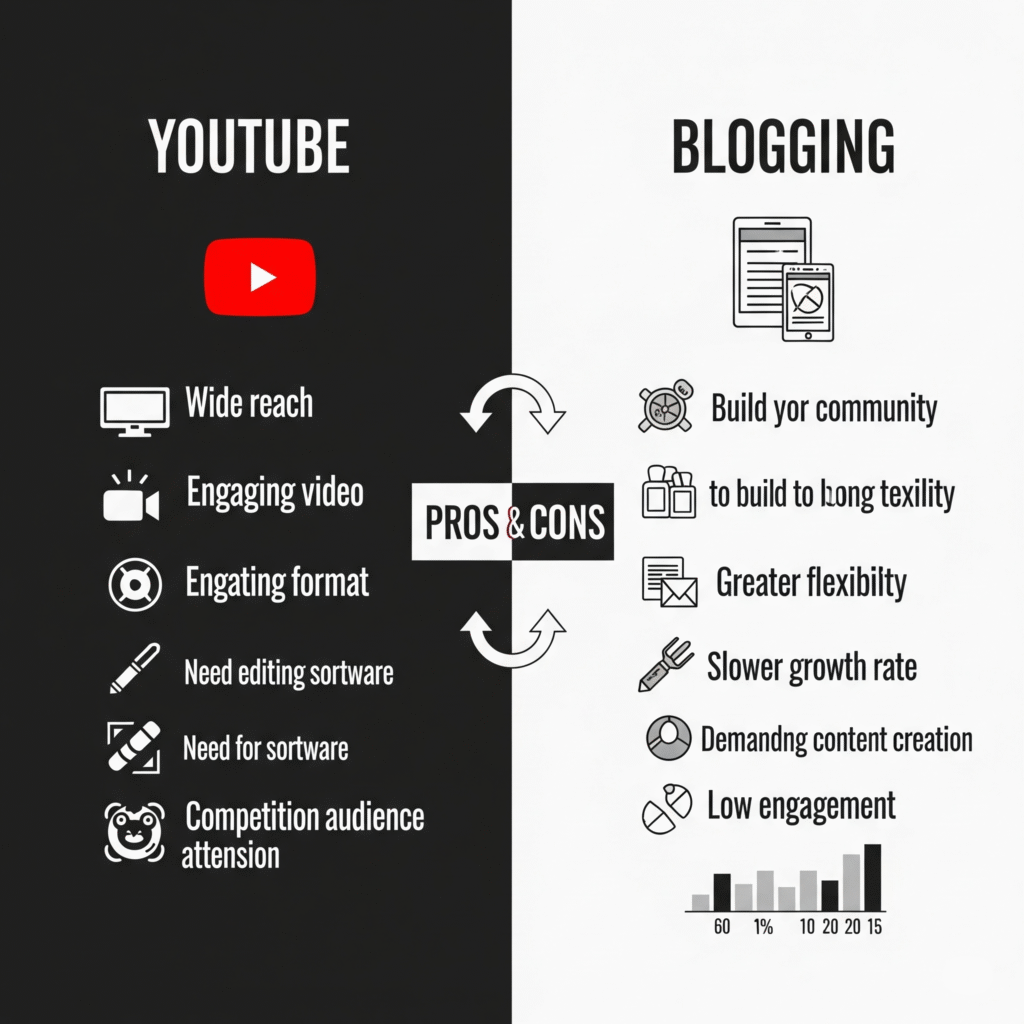
YouTube vs Blogging: Which Platform is More Profitable?
The profitability of YouTube vs Blogging depends on niche selection, consistency, and monetization strategies.
- YouTube has creators earning millions, but many small creators struggle to reach the first 1,000 subscribers milestone. CPM (Cost per thousand impressions) varies by niche—finance, tech, and education niches usually earn higher.
- Blogging profits depend on website traffic, SEO ranking, and affiliate marketing efforts. Niche blogs in finance, health, tech, and digital marketing have higher earning potential.
Verdict: Both platforms can generate significant income, but blogging offers better control, while YouTube offers rapid exposure if you hit trending content.
YouTube vs Blogging: Audience Building
For creators focused on building a loyal audience, understanding how each platform works is crucial.
YouTube Audience Growth:
- Visual content builds strong personal connection
- Comment sections and community tabs enhance engagement
- Subscribers get notified of new videos
- Algorithm can push content to millions
Blogging Audience Growth:
- SEO brings organic traffic from Google
- Email newsletters build long-term readers
- Blogs allow detailed, in-depth content
- Authority improves with backlinks and content quality
YouTube grows audience faster, but blogs build authority in search results
SEO: YouTube vs Blogging
Search Engine Optimization is key for visibility on both platforms, but SEO strategies differ.
YouTube SEO:
- Optimizing titles, descriptions, tags, and thumbnails
- Using relevant keywords naturally
- Audience retention and watch time matter
- Engaging with comments boosts ranking
Blogging SEO:
- Keyword research for blog topics
- On-page SEO (meta tags, headings, keyword usage)
- Off-page SEO (backlinks, guest posts)
- User experience and site speed optimization
Blogging SEO provides long-term, stable traffic, while YouTube SEO depends on algorithm changes.
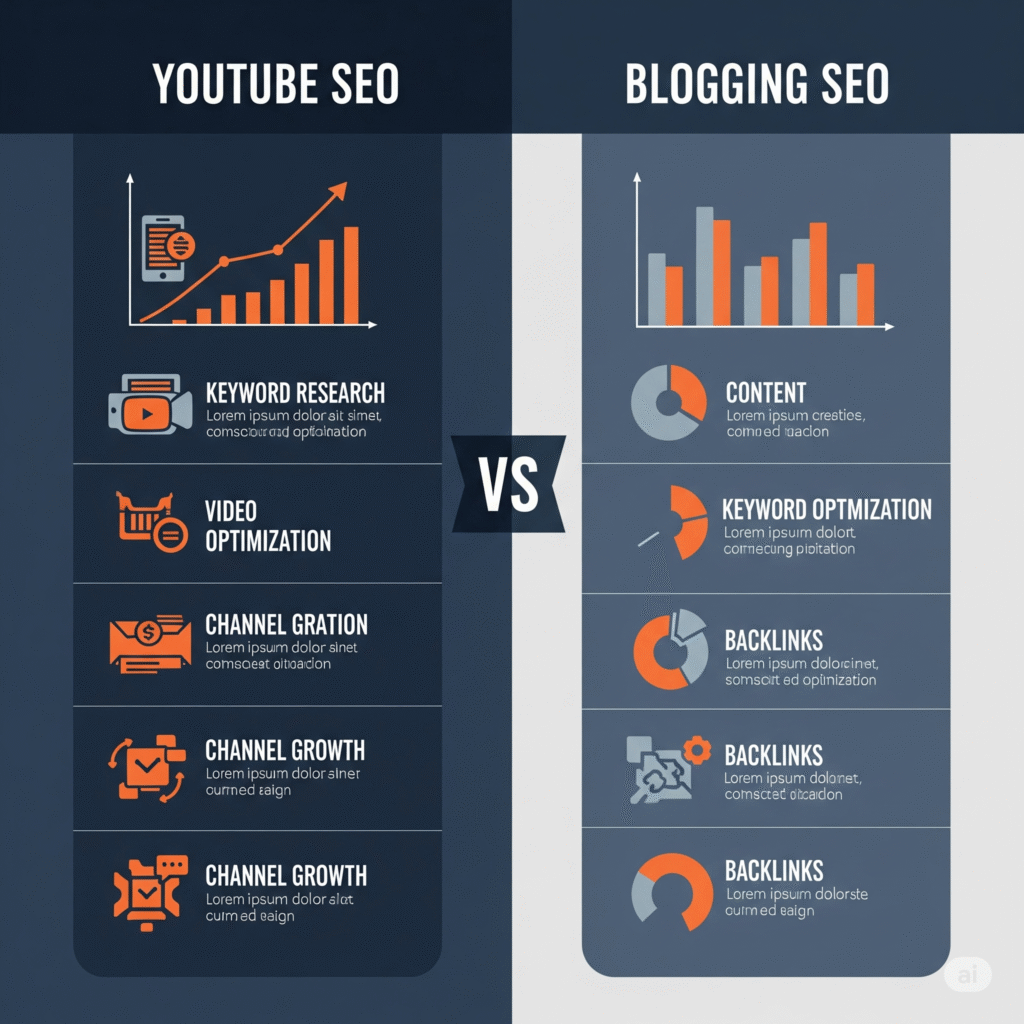
YouTube vs Blogging: Skills You Need
Let’s compare the essential skills for YouTube vs Blogging success.
| Skill | YouTube | Blogging |
|---|---|---|
| Content Planning | Required | Required |
| Video Editing | Essential | Not Required |
| Writing | Helpful (scripts) | Essential |
| SEO Knowledge | Important | Critical |
| Speaking on Camera | Required | Not Required |
| Marketing Skills | Required | Required |
If you’re camera-shy but love writing, blogging is ideal. If you enjoy presenting, explaining, and being creative with videos, YouTube is perfect.
YouTube vs Blogging: Which Should You Choose?
The final decision between YouTube vs Blogging depends on:
- Your comfort level (writing vs video creation)
- The resources you have (camera, editing tools, website hosting)
- Your target audience’s preferences
- How quickly you want to see results
- Your long-term income goals
Many successful creators use both YouTube and Blogging to maximize reach and income. For example, a blog can drive traffic to your YouTube videos, and YouTube can bring viewers to your blog or website.
Conclusion: YouTube vs Blogging – What’s Best for You?
Both platforms offer massive opportunities for growth, brand building, and making money online. There’s no one-size-fits-all answer to YouTube vs Blogging, but here’s a quick recommendation:
- Choose YouTube if you enjoy video creation, storytelling, and fast-paced growth.
- Choose Blogging if you prefer writing, long-term SEO strategies, and building a website you fully control.
Ideally, combining both can create a powerful online presence. Imagine writing a detailed blog post and embedding your YouTube video within it—double the impact!In the battle of YouTube vs Blogging, success comes to those who stay consistent, focus on valuable content, and adapt to audience feedback.
